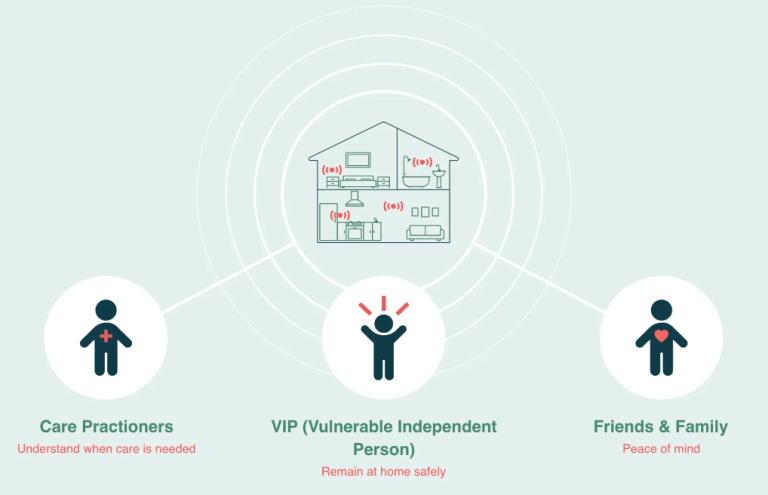The NHS could save over £1.2 billion by 2035 through the widespread adoption of lifestyle monitoring technology in social care, according to a new independent report. The report, commissioned by health-tech company Lilli, argues that this technology could revolutionise the health and social care sectors, addressing systemic issues such as hospital discharge delays and reducing the need for costly residential care.
The analysis, titled From Passive to Proactive: How Monitoring Technology Can Help Solve the Health and Social Care Crisis, highlights the transformative potential of AI-driven monitoring technology. The technology, which tracks key indicators of health and behaviour such as movement, eating, and bathroom activity, can alert carers to any concerning changes, allowing for proactive intervention before a hospital visit becomes necessary.
Hospital Discharge and Cost Savings
A significant finding of the report is the potential impact on hospital discharge, often referred to as ‘bed blocking.’ Delays in discharging patients who are ready to leave hospital but require additional care arrangements lead to inefficiencies and strain on the NHS. The report estimates that the use of monitoring technology could free up 2.3 million bed days, saving the NHS almost £1.2 billion by reducing the costs associated with extended hospital stays.
The benefits extend beyond financial savings; quicker discharge would lead to better health outcomes for patients, as prolonged hospital stays are associated with higher risks of infections, adverse drug reactions, and the likelihood of readmission. These savings, the report suggests, could be reinvested in the NHS, potentially funding the equivalent of 2,000 nurses over the next decade.
Supporting Independent Living and Reducing Care Costs
The report also details how lifestyle monitoring technology could support more people to live independently at home, thus reducing the reliance on more expensive residential care settings. The potential savings for councils are substantial, with an estimated £3 billion in savings by 2035. These savings are attributed to the prevention of hospital admissions and delayed transitions to residential care.
The productivity benefits for the social care workforce are equally compelling. The report suggests that the adoption of this technology could generate the equivalent of 10,000 additional full-time carers, helping to alleviate the current workforce crisis in care. Furthermore, the technology would free up an estimated 94 million hours of carer time, enabling resources to be more effectively allocated where they are most needed.
Case Studies and Local Impact
The report draws on data from multiple local authorities across the UK that have already implemented Lilli’s monitoring technology, including Islington, Nottingham, and Reading. Rebecca Andrew, Service Improvement Manager at Nottinghamshire County Council, highlighted the positive impact on social care provision in the area.
“The rollout of remote monitoring technology across Nottinghamshire allows our social care staff access to real-time data, giving insights into a person’s behaviour over a period of time. This helps them to build a clear picture of what is going on in a person’s life and draw their attention to any potential change in their social care needs,” Andrew said. “This ensures we can put appropriate care and support in place that is personalised to the individual, and respond quickly to prevent crises, meaning fewer ambulance callouts and hospital admissions.”
The Growing Need for Innovation in Care
As the UK’s older population continues to grow, the demand for health and social care services is set to increase sharply. The report warns that without urgent action to overhaul the system, the care sector will struggle to meet the needs of those who rely on it, leading to a reactive system unable to cope with the pressures of an ageing population.
Kelly Hudson, Chief Executive Officer at Lilli, urged the government to take decisive action. “Right now, the people who need care are not getting the help that they should, and the problem will only get worse as the population ages. The savings and productivity figures highlight the profound difference that an investment in technology now would have not just on the system but on the lives of people up and down the country,” Hudson said.
Hudson also expressed support for the new Health Secretary’s ambition for a “different politics on social care” and called for the government to address the crisis proactively by embracing a technology-led approach.
Conclusion
The report concludes with a call for the urgent adoption of lifestyle monitoring technology across the health and social care sectors. By doing so, councils and integrated care boards could unlock significant benefits, including improved patient outcomes, reduced costs, and enhanced care capacity. The alternative, the report warns, is a continued reliance on a reactive system that is ill-equipped to meet the growing needs of an ageing population.
The findings present a compelling case for the digitisation of care, offering a roadmap for how technology can play a crucial role in solving one of the most pressing challenges facing the UK today.


